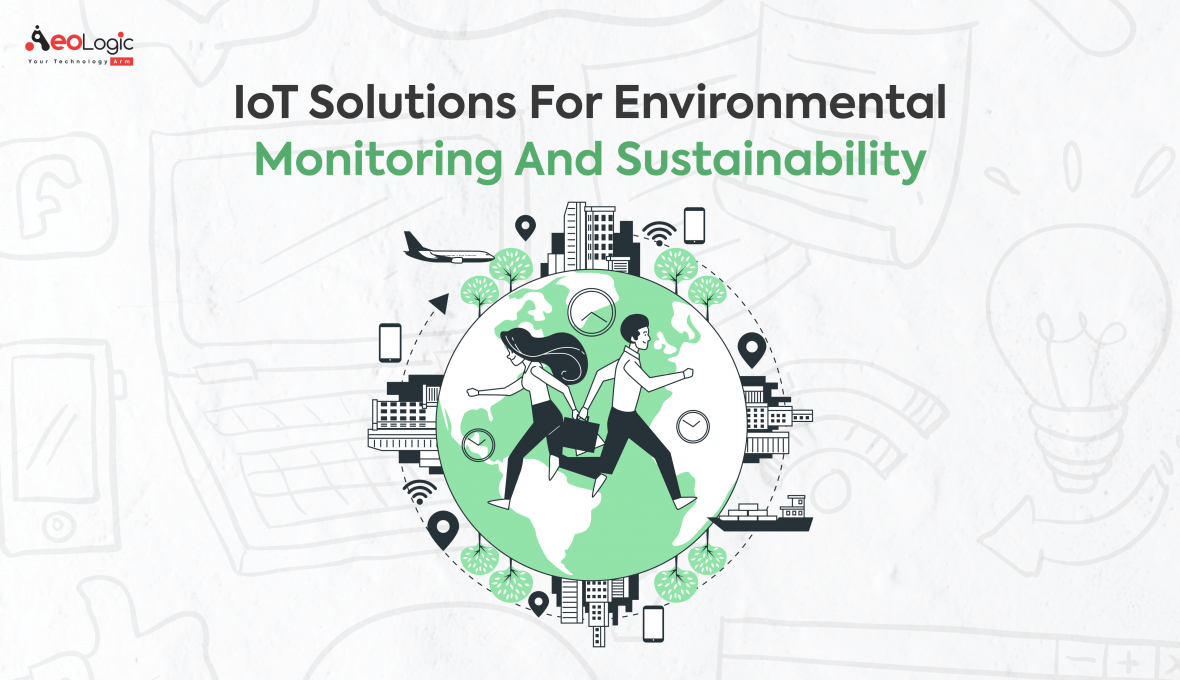Introduction
The advancement in technology is nearly linked to environmental sustainability and most probably, it’s perceived that technological advancements have an adverse impact on the environment. Technological inventions have captured human attention in the mid-18th century, since also humans are enabled to use natural resources to a lesser extent. Heavier operation of raw materials increased product and the global population have given rise to Co2 emigration and resource reduction. This blog discuss about the role of IoT solutions for environmental monitoring and sustainability.
Still, the relationship between the technology and environment has been changed now as the factors that propel sustainability and digital invention have been dissociated. This environmentally sustainable technological change has been led by a wide range of immersive technologies similar as robotics, AI and most importantly IoT. All of these technologies have the eventuality to change marketable and artificial procedures, along with making them environmentally friendly.
Also read: The Role of Technology in Sustainable Development
The following highlights the most important operations of IoT solutions for Environmental monitoring and sustainability. That are appreciatively impacting the environment and helping in making the earth greener.
Smart Energy Management
Customers currently are emphasizing more on sustainable technology. IoT devices help in managing a wide range of electricity supply chains. This includes electric serviceability, their energy consumption and supply from both distributors and consumer ends. These smart energy operation systems not only help in reducing energy spending but also help in minimizing carbon emigrations. As far as the energy operation monitoring is concerned, also it can be observed that the wireless utility measures deliver the energy consumption data at structure areas, individual and artificial means. Having these data- driven perceptivity help companies and individualities to cover their energy consumption and optimize it to achieve environmental sustainability.
Air Quality Monitoring
Air pollution is one of the arising global enterprises. As per the report published by World Health Organization, 7 billion unseasonable death occurs worldwide due to air pollution outside and inside the home. The adulterants in the air are also hazardous for human health. Poor quality air has significant ramifications on food and veggies, renewable energy, rainfall and water. Still, the innovative and low- cost IoT detectors have enabled the municipalities to cover the air quality indicator. In this way also the root cause of air pollution is tracked in real- time and municipalities apply corrective measures to reduce air pollution which makes the surrounding clean for human beings.
Smart Waste Management
An increase in the global population is also giving rise to the quantum of scrap humans produce. The inconsistent and uneconomical waste collection has made the situation more miserable. IoT, with its network of wireless detectors, can combat waste and scrap collection issues by enabling installation directors to pierce real- time data about trash containers. The installation directors can decide which waste holders need to be voided first after knowing about their current filler situations. With this information, the waste operation companies can optimize their waste collection schedule. As well as lower the environmental footmark by limiting the needless mobility of the waste collection exchanges.
Get in touch with us to know more about IoT Solutions!
Fleet Management
The focus on different energy types and their impact on the environment and air quality has been increased significantly. Governments each around the globe are also emphasizing reducing CO2 emigrations. This is putting further pressure on the fleet drivers to optimize their fleet operation conditioning and make them environmentally friendly. Vehicle health, driver behaviour, idle time, energy consumption and position all play a vital part in calculating the total emigration produced by the line. The critical sapience into these criteria can be penetrated with the help of wireless IoT detectors equipped in the lines. The data from the detectors can give useful sapience into vehicle conservation, ameliorate driver behaviour and optimize routes. For case, IoT detectors give a real- time position for more responsive and accurate route planning. This eventually reduces the dangerous emigration performing in the time spent by the vehicle footling in business.
Smart Water Monitoring
As per the exploration conducted by MIT researchers, further than half of the world’s population will be living in water- stressed regions by 2050. This highlights the explanation of espousing the solution which are fastening on water operation and can mainly reduce water waste annually. Nearly, 20 %- 30 % of drinking water is wasted by pipe leaks in municipalities. Wireless connectivity and IoT detectors have mainly reduced the cost of gathering and assaying the data from different water outfit similar as faucets, pumps or entire water processes like irrigation.
With the help of installing IoT leak discovery detectors in shops or structures, water leaks can be detected along with controlling the water quality and covering the filler situations. The intelligent system can instantly warn the installation directors. If any sign of a water leak is detected so that remedial conduct can be taken on time. These IoT systems if installed on a larger scale can reduce water waste and can save the land from adding water extremity. Thus, helping the environmental monitoring and sustainability.
Smart Agriculture
The availability of natural resources similar as arable land and freshwater is continuously depleting due to an increase in the global population. The situation has been exacerbated further with the low yields of chief crops annually. The result to meet the global demand for food lies within the conception of sustainable food product with smart agriculture which can also reduce environmental footmark and waste of resources. Smart agriculture systems powered by IoT technologies can help in achieving environmental sustainability.
The smart devices gather data about the factors similar as soil conditions etc. which contribute to crop growth. The analytics of the collected data provides useful information about various husbandry practices, namely, fumigation, fertilization, irrigation and sowing etc. This data- driven information helps growers in avoiding conditions that might impact the health of crops. Besides this, smart agriculture reduces error-prone and uneconomical human interventions along with minimizing water, chemical and other resource application. This eventually results in a lower environmental footmark and advanced product rates.
Also read: How Does Technology Help Sustainability
To Sum up!
In the last few decades, technology might have influenced the environment negatively. But today it has been directed towards creating the planet Earth greener. The IoT technologies for environmental monitoring and sustainability are allowing government, companies and individuals. For adopting energy-efficient exercises, organizing processes and using resources responsibly. For accomplishing long-term environmental sustainability.







